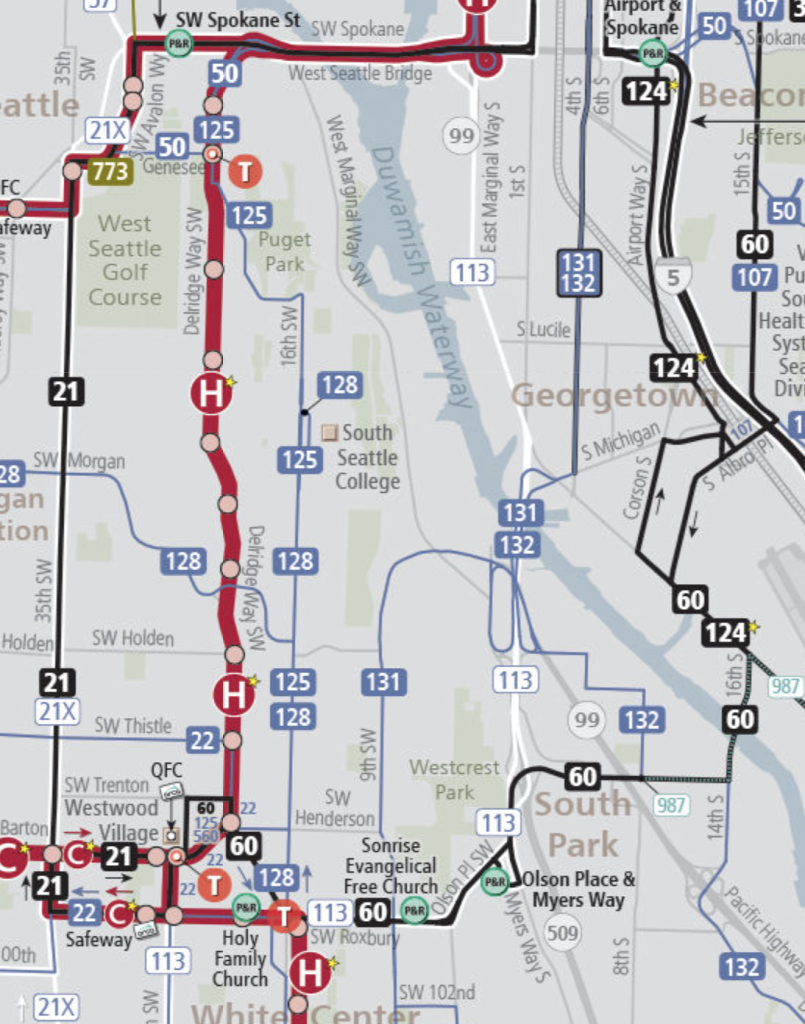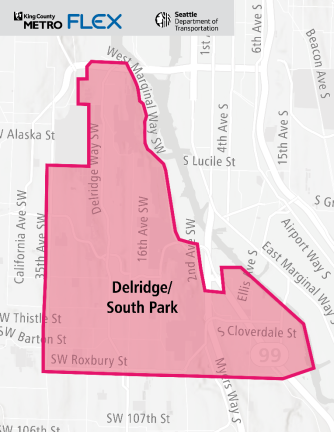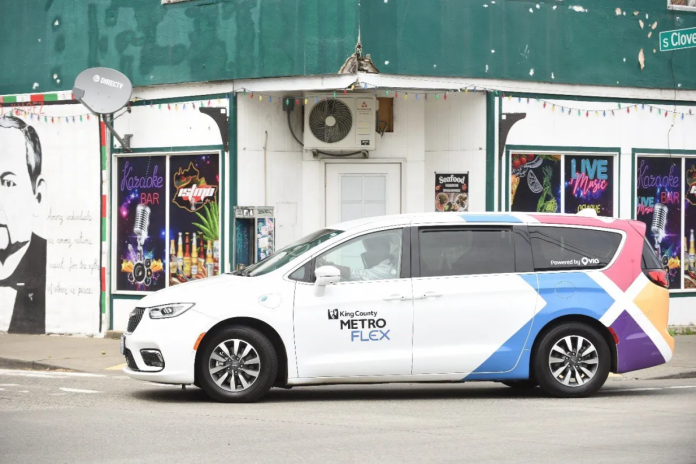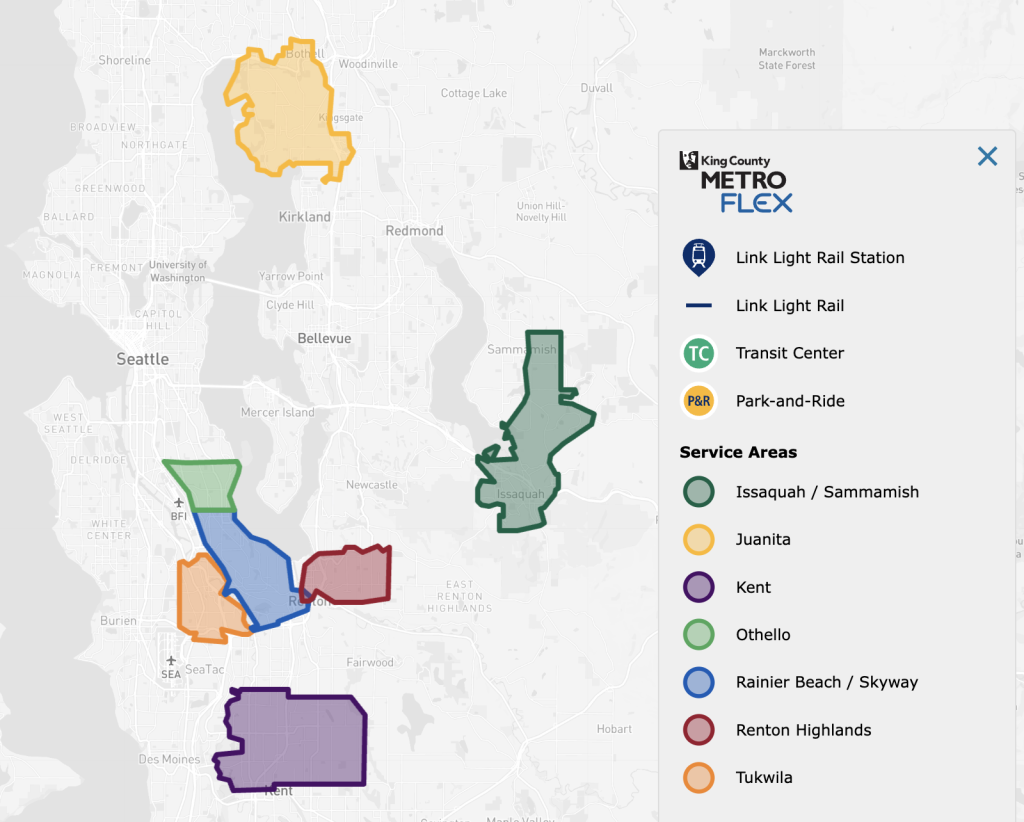King County Metro will be expanding its flexible on-demand shuttle service, Metro Flex, to Southwest Seattle in partnership with the City of Seattle. The new service area will span Delridge and South Park, offering transit riders door-to-door service within it starting on Monday, July 22. This will add to local and RapidRide bus service already serving much of the area.
“Metro Flex on-demand service will help people get where they need to go in Delridge and South Park by providing a ride to and from destinations throughout the community and to transit stops,” Greg Spotts, Seattle’s transportation director, said in a statement on Thursday. “I’m excited to see how riders utilize this service and am proud to be providing Seattle Transit Measure funding to help support this pilot.”
The Delridge/South Park Metro Flex service will operate as a pilot program for the next two years using an infusion of about $1.2 million from the Seattle Transit Measure, a ballot initiative which passed easily in 2020, raising roughly $39 million annually via sales tax revenue. Traditionally, the transit measure has augmented bus service, but Seattle has shifted some funding to over initiatives, as Metro has struggled to staff bus service hours due to its labor shortage.
The Southwest service area is the only on-demand transit service being funded by the City at this time. Seattle selected Delridge and South Park for Metro Flex investment because of a Seattle Department of Transportation equity analysis, which registered the area as a high priority.

Existing bus service in the area is provided by a mix of all-day routes, including Routes 60, 125, 128, 131, 132, and the RapidRide D Line. Most of the routes, however, run north-south, making connections between some destinations relatively inconvenient by the transit. The main exception is Route 60, which runs east-west between Westwood Village and South Park. Metro Flex will enable point-to-point service anywhere within the Delridge/South Park service area. Major community draws within it include South Seattle College, Chief Sealth High School, and local libraries along with Westwood Village, White Center, and other business districts.

The new Metro Flex service will operate seven days a week using minivans driven by contracted Via Transportation operators. Span of service will be 6am to 11pm all days of the week.
Riders can request trips on Metro Flex by using the mobile app, online, or by calling 206.258.7739. When using the app, riders choose their intended destination within the service area and can specify needs, such as a vehicle capable of transporting wheelchairs or bikes. Usually the pick-up location will be close by, if not the same spot, where a rider requests a trip, and up to four other riders can be booked under the same trip request. Once a trip has been booked, an estimated arrival time will be provided.
Since Metro Flex still functions like transit, vehicles may make stops along the way and carry other riders. So riders should expect that some trips will be shared.
Cost for a regular adult fare on Metro Flex is $2.75, the same as a standard trip on Metro buses. Discounts are available for senior, disabled, and low-income riders through the Regional Reduced Fare Pass and ORCA LIFT programs, and youth aged 18 and under can ride for free.
Onboard, operators will accept ORCA passes and digital Transit Go Tickets for valid fare payment. Riders, however, can prepay for trips using credit and debit cards through the Metro Flex app. Cash isn’t accepted as a payment option.
The new service joins seven other Metro Flex service areas, including two in Seattle. Most of these are concentrated on the South End with Kent, Renton Highlands, Tukwila, Othello, and Rainier Beach/Skyway. But there are service areas in Juanita/Kenmore/Bothell and Issaquah/Sammamish.
Existing Metro Flex service in Seattle is generally more productive and less costly per boarding than Metro Flex services elsewhere in King County. Metro Flex data from last year shows relatively high costs across the board and meager ridership:
| Metro Flex Service | Riders Per Hour | Cost Per Rider | ||
| Highest | Lowest | Lowest | Highest | |
| Juanita | 1.5 | 1.4 | $37.12 | $40.78 |
| Kent | 1.8 | 0.9 | $12.10 | $49.21 |
| Othello | 4.8 | 3.6 | $11.75 | $15.89 |
| Rainier Beach | 4.1 | 3.1 | $13.82 | $18.01 |
| Renton | 3.8 | 2.9 | $14.91 | $19.66 |
| Sammamish | 2.6 | 1.8 | $21.71 | $30.93 |
| Skyway | 4.3 | 2.7 | $13.26 | $20.50 |
| Tukwila | 4.3 | 3.1 | $13.29 | $18.21 |
This isn’t the first foray into sponsoring on-demand microtransit for Seattle. Prior to the pandemic, the City funded Ride2, a shuttle van service running between Alaska Junction and Seacrest Park ferry dock that registered low ridership and a sky-high cost of $84 per rider. The service was canceled abruptly in December 2019. Seattle commissioned another van service, Via to Transit, prior to the pandemic in Othello and Rainier Beach, and found a bit more success. Despite the high cost of service, ridership fared better and the service was eventually folded into the Metro Flex brand last year.
Later this fall, funding from the Seattle Transit Measure is set to beef up regular bus service in the Delridge and South Park areas, offering a much broader impact than Metro Flex will. Routes 60 and 125 will see more frequent service, beginning on Saturday, September 14 when Metro’s fall service change goes into effect. That will bring an extra 60-plus bus trips each week to Route 60, improving service between Westwood Village and South Park, and expand Route 125 service in the Delridge area to seven days a week with 26 trips on Sundays and more weekday and Saturday service.
At 5,176 boardings per weekday in 2023, Route 60 may wind up serving more ridership in a week than the Metro Flex pilot program is likely to manage all year.
Stephen is a professional urban planner in Puget Sound with a passion for sustainable, livable, and diverse cities. He is especially interested in how policies, regulations, and programs can promote positive outcomes for communities. With stints in great cities like Bellingham and Cork, Stephen currently lives in Seattle. He primarily covers land use and transportation issues and has been with The Urbanist since 2014.



